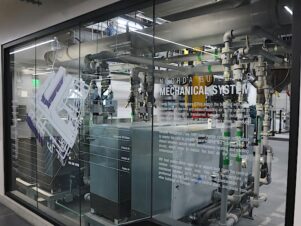Between 1900 and 1950, cities in all 50 US states installed over 9 million lead water service lines which, in many cases, were mandated for benefits including their longevity. With most of these pipes lasting between 75 and 100 years, many are still in use today, despite the fact that we’re now fully aware of how risky high water lead levels can be.
At the end of 2024, Joe Biden proposed the ‘Lead Replacement scheme’, which aims to oversee the complete replacement of American lead piping systems in the next ten years. While there has been some concern about the viability of the ten-year timeline, states, cities, and water utilities all agree that plumbing infrastructure needs to change. The question is, what does Biden’s proposal mean for the plumbing professionals?
Ultimately, replacements of dangerous lead piping are good news, making jobs safer and ensuring better customer-facing results. But it would be naive to assume that a total infrastructure overhaul won’t bring any industry disruption. Luckily, plumbers can easily adapt to any upcoming changes with the following vital tips.
# 1 – Learning New Regulations and Compliance
Biden’s proposal shines a light on an industry problem that’s been causing significant health problems for years. We already know that high levels of lead exposure can lead to everything from developmental problems to cardiac arrest, and it’s certainly contributed to the health debt outlined by Alex Kleyner in this article. As water utilities take a step towards healthier processes, it’s more important than ever for plumbing professionals to stay on top of new regulations and compliance requirements for ongoing client safeguarding.
To handle lead pipe replacements, plumbing professionals particularly need to seek the correct accreditation, as well as specific pipe replacement certifications as supplied by Plumbing Manufacturers International.
# 2 – Developing Expertise
While the extent and speed required for this mass replacement task might seem overwhelming, the replacement of lead piping also opens the door to requirements for brand new plumbing expertise. This is true in terms of replacements themselves, which not every plumber will be authorized to carry out, but there are plenty of other learning opportunities waiting within this change.
For instance, plumbers who are experienced in identifying lead piping will inevitably see an increase in business over the next decade. Equally, with most lead pipes being replaced by alternatives such as copper, iron, and steel, plumbers with experience in these materials will typically perform better.
# 3 – Getting Ahead of the Competition
Lead pipe replacements may bring new possibilities for industry business over the coming years, but they’ll also initiate a competitive rush to secure clients. As well as ensuring their accreditation and experience, plumbing professionals will need to find alternative ways to get ahead and come out on top in the new plumbing world, including offering competitive pricing, providing complete pipe replacement packages, and generally ensuring exemplary service.
The plumbing industry is on the cusp of a big change, but plumbing professionals can easily keep up with the tide if they simply bear these tips in mind.




Join the conversation: